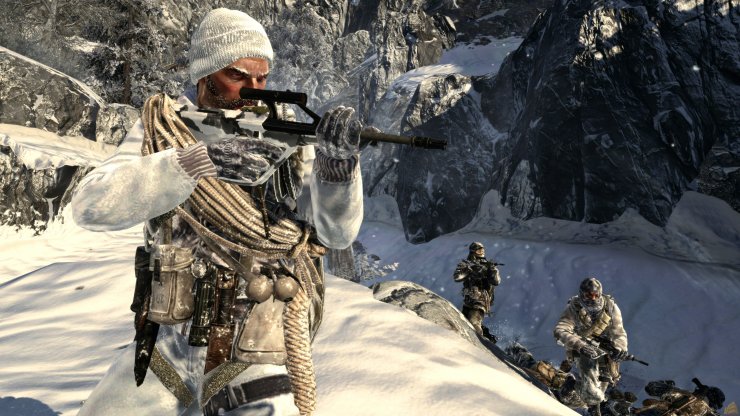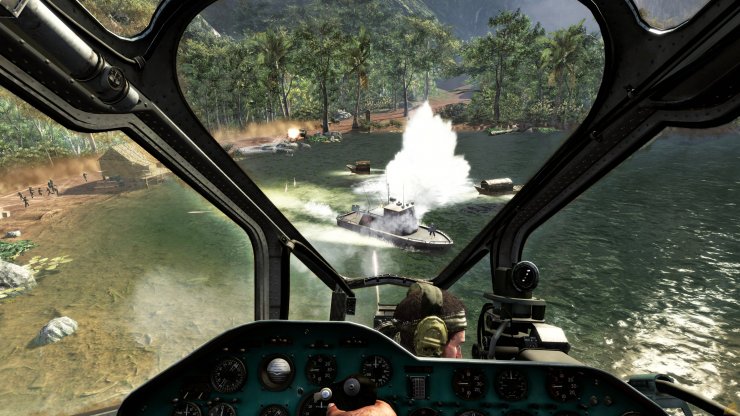Nowhere is this point driven home more than in the single player campaign mode. Although perfectly functional, the incredibly brief story feels less like a cohesive whole and more like a series of concepts and set pieces torn directly from other Call of Duty games. The game opens with the obligatory hostage scenario, in which an enemy takes a human shield, time slows down, and you must pull off a head shot with your pistol to save the day. It seems like this scene alone has been in at least five or six games since the first Modern Warfare popularized it. From there, the game throws you into an off road vehicle chase, a few on-rails shooting segments, a scene in which you use guided missiles to destroy targets, and a "follow your AI partner and do everything exactly as he says or fail" stealth scene that has apparently become a requirement for all modern shooters. The campaign portion of Black Ops is almost embarrassingly devoid of new and interesting ideas. Worst of all, these now-standard shooter elements were all popularized by the Call of Duty franchise, making the entire game feel like a less polished highlight reel of past games. You know that a series has gone creatively bankrupt when it starts ripping itself off.
It is not just creative issues that plague the campaign, though. Objective design and placement can be baffling at times. There was one scene in particular in which your squad mates point out several barrels full of napalm, telling you to blow them up. At this point in the game, you will have destroyed countless explosive barrels by shooting them, so this objective seems second nature. Just shoot the barrels. Only it is not that simple. For some reason, the game will not allow you to shoot the barrels to destroy them. Instead, it demands that you run across a battlefield full of infinitely spawning enemies (another tactic that the Call of Duty series uses far too much) and walk directly up to the barrels, puncture them with your knife, and then blow them up. Even this strange mission design would be forgivable if the objective marker pointed you in the right direction, but it does no such thing. Instead, it guides you into the middle of a trench filled with a never ending flood of Vietcong and then disappears, leaving you directionless for a few seconds before you are inevitably mowed down. This is the worst offense in the game, but there are a few other moments that feel weird and out of place.

This is quite a shame, because once in a blue moon the campaign will bare its teeth and you will catch a glimpse of what could have been. Carving through Hue City with the much-hyped Dragon's Breath shotgun, for example, is a standout moment. So is the visceral torture scene that follows. These excellent moments are unfortunately the exception and not the rule, and even they are marred by the incomprehensible plot. What starts out as a fairly intriguing tale of international espionage quickly becomes messy and confusing, as Call of Duty games have seemed prone to lately. The set piece moments would have had much more impact if they had been backed up by an equally powerful context.
Luckily, the campaign has never been the main draw for this series. Most people were excited for Black Ops because of competitive and co-operative play, and in these respects the game delivers, but only to a certain extent. The much-anticipated return of zombies is accompanied by much fanfare but little compelling substance. Part of the fun in the last zombies mode was the variety of the maps. The first map was small and claustrophobic, which is how I prefer my zombie encounters. The second map was excellent as well, introducing upgradeable perks to the equation. The final two maps were great fun as well, but a little too big for just two or three players to take full advantage of. This variety of maps made for a superb and addicting experience for any number of players. Black Ops lacks this variety, instead opting for much larger and more confusing maps. While navigating the numerous winding hallways can be a lot of fun, playing with any less than four players becomes frustrating and hard to manage.
This problem is magnified by the revamped pacing of the zombies mode. The zombies come faster and in greater numbers than they did before, and they become harder to kill faster than they used to. Round three in Black Ops feels more like round six or so in World at War. This is certainly not a bad thing, as it keeps the game exciting even in the beginning stages. Coupled with the huge maps, though, it makes playing with any less than four players futile. If you, like me, enjoyed playing zombies with one other person in split screen, you will have zombies breaking through the windows and coming after you in the very first round. Unlike in the first game, there are also very few good spots to make a stand. Instead, most levels play out with players running around like chickens with their heads cut off. Luckily, there is also a greater variety in the enemies that you'll face and in the methods available for killing them, so while the game feels much harder than necessary, at least it can boast a large variety of content.

So if the campaign of Black Ops is starting to feel stale and the zombies mode is not the addiction it once was, what saving grace does the game have? Simply put, the competitive multiplayer modes are so addictive they should come with a Surgeon General's Warning. This is the same Call of Duty multiplayer that you have played before, sure, but it has seen an infusion of new ideas that the rest of the game would have done well to imitate. The most important addition is that of an in-game economy. Now, in addition to gaining levels for kills and objectives, you will also gain CoD points. These points function as a currency that allows you to buy new guns, attachments, perks, grenades, customization options, and more. Instead of leveling up and being handed a seemingly random weapon or perk as was the case in the past, the level-ups merely unlock the option of purchasing these new items from the shop with your CoD points. This makes the game feel infinitely more open that it did in the past, and the economy that surrounds them breathes new life into the classic modes.
The Wager Matches, for example, focus around the concept of a six-man deathmatch. Each of the modes puts a different spin on killing everyone you see. One has you creeping around with one bullet in your gun, while another rewards you with a new gun for each kill you get, and yet another assigns everyone a random gun for a certain amount of time before switching out to another random gun. Before each Wager Match, you will place a bet using your CoD points. You will only get a return on your money if you fall in the top three players at the end of the match. This can certainly make the matches frustrating, but it also increases the stakes, and honestly, if you have been playing CoD long enough to be this confident in your skills, you have probably become accustomed to a little frustration here and there.
Although the campaign often flounders and the zombies mode does not live up to the nostalgia, the new multiplayer features carry Black Ops limping over the finish line. The CoD points, coupled with some excellent level design, make fragging your friends one last time all but irresistible. But that is the feeling that has stayed with me over the course of Black Ops: the feeling that this is the last time I will truly enjoy a Call of Duty game. The campaign has clearly run out of new ideas, instead opting to retread already well-covered ground ad nauseum with only one or two interesting ideas presented in between. The zombies mode has lost focus on what made it fun in the first place. Competitive multiplayer is this game's saving grace, and even there it is apparent that there is not much else that can be done in future iterations without shaking up the foundations of the franchise a little. Will the next Call of Duty game be the one that tips the franchise from industry leader to stagnant reiteration? The optimist in me hopes not, but the realist in me is inclined to disagree.